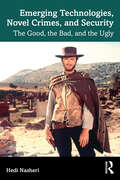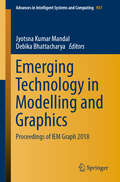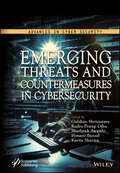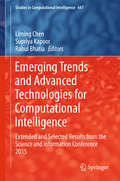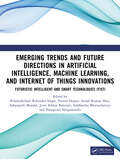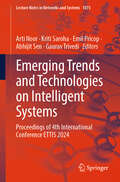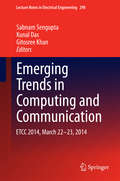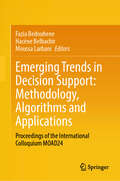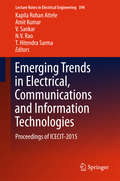- Table View
- List View
Emerging Technologies with Advanced Devices from Micro to Nano: ETMN 2024 (Lecture Notes in Electrical Engineering #1370)
by Subhas Chandra Mukhopadhyay Tarikul Islam Shabana Mehfuz Shakeb A. Khan Mohammad Ajmal KhanThis book presents the proceedings of the 6th International Conference on Emerging Technologies: Micro to Nano (ETMN), held in New Delhi, India, on November 22-23, 2024. It showcases advances and innovations in micro and nanotechnologies and covers topics such as nano composites, nano materials, micro/nano fluidics, micro optics, organic and flexible electronics, advanced materials for nano devices, MEMS, smart biomimetic sensors, electrochemical sensors, acoustic and optical sensors, micro/nano sensors, wearable sensors, intelligent instrumentation, micro/nano electronics, nano antenna and RF system design, wireless sensor networks, applications of AI and IoT-based system, and structural health monitoring (SHM).
Emerging Technologies, Novel Crimes, and Security: The Good, the Bad, and the Ugly
by Hedi NasheriThis book provides a holistic overview of the complexities of modern technological advances and their implications for crime and security. It examines the societal dilemmas that accompany these technologies, their strategic impact on geopolitics, governments, business, and civil society.The increasingly interconnected world gives rise to novel crimes and creates a new, complex set of threats. Understanding this landscape is essential to strategizing for the prevention, protection, mitigation, and risk assessment of technology-related crime.Practical and approachable, this book builds knowledge and awareness of the impact of emerging technologies on crime and security among professionals, students, academicians, researchers, and policymakers.
Emerging Technology Trends in Electronics, Communication and Networking: Select Proceedings of the Fourth International Conference, ET2ECN 2021 (Lecture Notes in Electrical Engineering #952)
by Vinay Kumar Rasika Dhavse Salvatore MonteleoneThis book constitutes refereed proceedings of the Fourth International Conference on Emerging Technology Trends in Electronics, Communication and Networking, ET2ECN 2021. The volume covers a wide range of topics, including electronic devices, VLSI design and fabrication, photo electronic systems and applications, integrated optics, embedded systems, wireless communication, optical communication, free-space optics, signal processing, image/audio/video processing, wireless sensor networks, next-generation networks, network security, and many others. The book will serve as a valuable reference resource for academia and researchers across the globe.
Emerging Technology Trends in Electronics, Communication and Networking: Third International Conference, ET2ECN 2020, Surat, India, February 7–8, 2020, Revised Selected Papers (Communications in Computer and Information Science #1214)
by Shilpi Gupta Jignesh N. SarvaiyaThis book constitutes refereed proceedings of the Third International Conference on Emerging Technology Trends in Electronics, Communication and Networking, ET2ECN 2020, held in Surat, India, in February 2020.The 17 full papers and 6 short papers presented were thorougly reviewed and selected from 70 submissions. The volume covers a wide range of topics including electronic devices, VLSI design and fabrication, photo electronics, systems and applications, integrated optics, embedded systems, wireless communication, optical communication, free space optics, signal processing, image/ audio/ video processing, wireless sensor networks, next generation networks, network security, and many others.
Emerging Technology Trends in Internet of Things and Computing: First International Conference, TIOTC 2021, Erbil, Iraq, June 6–8, 2021, Revised Selected Papers (Communications in Computer and Information Science #1548)
by Abir Hussain Dhiya Al-Jumeily Panos Liatsis Salama A. MostafaThis volume constitutes selected papers presented at the First International Conference on Emerging Technology Trends in IoT and Computing, TIOTC 2021, held in Erbil, Iraq, in June 2021. The 26 full papers were thoroughly reviewed and selected from 182 submissions. The papers are organized in the following topical sections: Internet of Things (IOT): services and applications; Internet of Things (IOT) in healthcare industry; IOT in networks, communications and distributed computing; real world application fields in information science and technology.
Emerging Technology for Sustainable Development: Select Proceedings of EGTET 2022 (Lecture Notes in Electrical Engineering #1061)
by Jatindra Kumar Deka P. S. Robi Bobby SharmaThis volume comprises the select peer-reviewed proceedings of the 2nd International Conference on Emerging Trends in Engineering and Technology (EGTET 2022). It provides a comprehensive and broad spectrum picture of the state-of-the-art research and development in the area of speech processing, remote sensing, blockchain technology, the Internet of Things, power systems economics, AC/DC microgrids, smart energy metering and power grids, etc. This volume will provide a valuable resource for those in academia and industry.
Emerging Technology in Modelling and Graphics: Proceedings of IEM Graph 2018 (Advances in Intelligent Systems and Computing #937)
by Jyotsna Kumar Mandal Debika BhattacharyaThe book covers cutting-edge and advanced research in modelling and graphics. Gathering high-quality papers presented at the First International Conference on Emerging Technology in Modelling and Graphics, held from 6 to 8 September 2018 in Kolkata, India, it addresses topics including: image processing and analysis, image segmentation, digital geometry for computer imaging, image and security, biometrics, video processing, medical imaging, and virtual and augmented reality.
Emerging Threats and Countermeasures in Cybersecurity (Advances in Antenna, Microwave, and Communication Engineering)
by Gulshan Shrivastava Kavita Sharma Himani Bansal Shashank Awasthi Rudra Pratap OjhaThis book is an essential resource for anyone seeking to stay ahead in the dynamic field of cybersecurity, providing a comprehensive toolkit for understanding and combating digital threats and offering practical, insightful guidance ideal for cybersecurity professionals, digital forensic investigators, legal practitioners, law enforcement, scholars, and students. In the rapidly evolving domain of digital security, this book emerges as a vital guide for understanding and addressing the sophisticated landscape of cyber threats. This in-depth volume, featuring contributions from renowned experts, provides a thorough examination of the current state and future challenges in digital security and forensic analysis. The book is meticulously organized into seven sections (excluding conclusion), each focusing on a critical aspect of cybersecurity. It begins with a comprehensive overview of the latest trends and threats in the field, setting the stage for deeper explorations in subsequent sections. Readers will gain insights into a range of topics, from the intricacies of advanced persistent threats and malware, to the security nuances of cyber-physical systems and the Internet of Things (IoT). The book covers cutting-edge topics like blockchain, cryptography, social engineering, cloud security, and data privacy, blending theory with practical case studies. It’s a practical guide for cybersecurity professionals, forensic investigators, legal practitioners, law enforcement, scholars, and students. Offering a comprehensive toolkit for combating digital threats, it’s essential for staying ahead in the fast-evolving field of cybersecurity.
Emerging Topics in Hardware Security
by Mark TehranipoorThis book provides an overview of emerging topics in the field of hardware security, such as artificial intelligence and quantum computing, and highlights how these technologies can be leveraged to secure hardware and assure electronics supply chains. The authors are experts in emerging technologies, traditional hardware design, and hardware security and trust. Readers will gain a comprehensive understanding of hardware security problems and how to overcome them through an efficient combination of conventional approaches and emerging technologies, enabling them to design secure, reliable, and trustworthy hardware.
Emerging Trends and Advanced Technologies for Computational Intelligence
by Supriya Kapoor Rahul Bhatia Liming ChenThis book is a collection of extended chaptersfrom the selected papers that were published in the proceedings of Science andInformation (SAI) Conference 2015. It contains twenty-one chapters in the fieldof Computational Intelligence, which received highly recommended feedbackduring SAI Conference 2015 review process. During the three-day event 260scientists, technology developers, young researcher including PhD students, andindustrial practitioners from 56 countries have engaged intensively inpresentations, demonstrations, open panel sessions and informal discussions.
Emerging Trends and Applications in Artificial Intelligence: Selected papers from the International Conference on Emerging Trends and Applications in Artificial Intelligence (ICETAI) (Lecture Notes in Networks and Systems #960)
by Fausto Pedro García Márquez Akhtar Jamil Alaa Ali Hameed Isaac Segovia RamírezThe book covers the proceedings of the International Conference on Emerging Trends and Applications in Artificial Intelligence (ICETAI) held at Istanbul Medipol University, Turkey, on 24 – 25 August 2023. It presents a comprehensive compilation of papers covering the forefront of artificial intelligence, encapsulating state-of-the-art models, innovative methodologies applied to benchmark datasets, and incisive analyses addressing contemporary challenges. Encompassing four pivotal tracks—Artificial Intelligence and Machine Learning, Big Data and Cloud Computing, Internet of Things and Sensor Technology, and Applications of Artificial Intelligence—this volume serves as a vital resource for researchers, scholars, and professionals navigating the multifaceted landscape of AI advancements and their real-world applications across diverse domains.
Emerging Trends and Future Directions in Artificial Intelligence, Machine Learning, and Internet of Things Innovations (Conference Proceedings Series on Futuristic Intelligent and Smart Technologies)
by Nazrul Hoque Siddhartha Bhattacharyya Arnab Kumar Maji Jyoti Sekhar Banerjee Sabyasachi Mondal Panagiotis Sarigiannidis Khumukcham Robindro SinghThe “North East India AI Summit: Unravelling Trends (NEIAIS 2025)” served as a vibrant platform for the exchange of cutting-edge ideas and research in the field of Artificial Intelligence, with a strong emphasis on both foundational theo□ries and real-world applications. The summit brought together experts, researchers, and enthusiasts to explore critical areas including Machine Learning, Deep Learning, Computer Vision, Natural Language Processing, Smart Systems, IoT Security, Network Technology, and Artificial Intelligence in Healthcare and Biomedical Applications. Discussions also delved into emerging trends and computational techniques, highlighting the transformative potential of AI in addressing complex, real-world challenges. The conference received an overwhelming response, attracting more than 120 research paper submissions from various regions of India and abroad. After a rigorous review process, 55 high-quality papers were accepted, out of which over 44 papers were registered for presentation at the summit. By fostering interdisciplinary col□laboration and showcasing impactful innovations, NEIAIS 2025 aims to inspire sustained research, technological growth, and broader societal benefits.
Emerging Trends and Technologies on Intelligent Systems: Proceedings of 4th International Conference ETTIS 2024 (Lecture Notes in Networks and Systems #1073)
by Emil Pricop Arti Noor Abhijit Sen Gaurav Trivedi Kriti SarohaThis book presents best selected papers presented at the 4th International Conference on Emerging Trends and Technologies on Intelligent Systems (ETTIS 2024) held from 27 to 28 March 2024 in hybrid mode at CDAC, Noida, India. The book includes current research works in the areas of artificial intelligence, big data, cyber-physical systems, and security in industrial/real-world settings. The book illustrates on-going research results, projects, surveying works, and industrial experiences that describe significant advances in all of the related areas.
Emerging Trends for Securing Cyber Physical Systems and the Internet of Things (Future Generation Information Systems)
by Bharat Bhushan Sudhir Kumar Sharma Ahmed J. Obaid Achyut Shankar Parma NandIn the past decades, cyber-physical systems (CPSs) have been widely applied to fields such as smart grids, environment monitoring, aerospace, smart transportation, and industrial automation. Great strides have been made in CPSs to improve the computing mechanism, communication, and quality of service by applying optimization algorithms. Currently, these efforts are integrated with the applications of machine learning (ML) and artificial intelligence (AI). To maintain system reliability and stability, CPSs such as smart grids face numerous challenges, including large-scale Internet-of-Things (IoT) device adaptation, ever-increasing demands of electrical energy, and the rise of a wide range of security threats. These challenges bring forth the need to find sustainable and advanced solutions to guarantee reliable and secure operations in these systems.The goal of this book is to foster transformative, multidisciplinary, and novel approaches that ensure CPS security by taking into consideration the unique security challenges present in the environment. This book attracts contributions in all aspects pertaining to this multidisciplinary paradigm, which includes the development and implementation of Smart CPS, Supervisory Control and Data Acquisition (SCADA) systems, CPS for Industry 4.0, CPS architecture for IoT applications, and CPS forensics.This book: Discusses concepts including wireless sensor networks (WSNs), CPSs, and the IoT in a comprehensive manner. Covers routing protocols in sensor networks, attacks, and vulnerabilities in WSNs, the Internet of Cyber-Physical Things, and CPSs for industrial applications. Highlights technological advances, practical solutions, emerging trends, and prototypes related to privacy in CPSs and the IoT. Presents a pathway and architecture for proactive security schemes in CPSs to counter vulnerabilities, including phishing attacks, malware injection, internal stealing of data, and hacking. Discusses the most recent research and development on the enabling technologies for IoT-based CPSs. Owing to the scope and diversity of topics covered, the book will be of interest not only to researchers and theorists but also to professionals, material developers, technology specialists, and methodologists dealing with the multifarious aspects of data privacy and security enhancement in CPSs. The book will provide these professionals an overview of CPS security and privacy design, as well as enlighten them to promising solutions to research problems such as cyberattacks in CPS, risk identification and management in CPS, ML-based trust computational models for CPSs, nature-inspired algorithms for CPSs, and distributed consensus algorithms for event detection in CPSs. The secondary target audience of this book includes legal practitioners, hackers, cyber law policymakers, cyber forensic analysts, and global security consortiums who may use it to further their research exposure to pertinent topics in cybersecurity.
Emerging Trends in Artificial Intelligence, Data Science and Signal Processing: First International Conference, AIDSP 2023, Kanpur, India, October 20–21, 2023, Proceedings, Part I (Communications in Computer and Information Science #2439)
by Karm Veer Arya Saurabh Singh Ciro Rodriguez Rodriguez Altaf Osman MulaniThe two-volume set, CCIS 2439 and CCIS 2440, constitutes the proceedings of the First International Conference on Emerging Trends in Artificial Intelligence, Data Science and Signal Processing, AIDSP 2023, held in Kanpur, India, in October 2023. The 25 full papers and 11 Short papers in this book were carefully reviewed and selected from 260 submissions. These papers focus on the topics such as Artificial Intelligence, Machine Learning and Signal Processing.
Emerging Trends in Artificial Intelligence, Data Science and Signal Processing: First International Conference, AIDSP 2023, Kanpur, India, October 20–21, 2023, Proceedings, Part II (Communications in Computer and Information Science #2440)
by Karm Veer Arya Saurabh Singh Ciro Rodriguez Rodriguez Altaf Osman MulaniThe two-volume set, CCIS 2439 and CCIS 2440, constitutes the proceedings of the First International Conference on Emerging Trends in Artificial Intelligence, Data Science and Signal Processing, AIDSP 2023, held in Kanpur, India, in October 2023. The 25 full papers and 11 Short papers in this book were carefully reviewed and selected from 260 submissions. These papers focus on the topics such as Artificial Intelligence, Machine Learning and Signal Processing.
Emerging Trends in Computer Science and Its Application
by Anurag Tiwari Manuj DarbariThe conference brought together a diverse group of scholars, researchers, and industry professionals to engage in meaningful discussions and share insights on cutting-edge trends in artificial intelligence, machine learning, data science, and their multifaceted applications. This collaboration and knowledge exchange fostered an environment of innovation, making the conference a successful and impactful event for all participants. It aimed to highlight these significant advancements and serve as a valuable resource for researchers, academicians, and practitioners who wish to stay informed about the recent innovations and methodologies shaping the landscape of computational intelligence. By showcasing a wide range of research topics and practical implementations, it not only addressed the current challenges but also inspired new ideas and approaches for future research.
Emerging Trends in Computing and Communication
by Sabnam Sengupta Kunal Das Gitosree KhanThe book presents papers delivered by researchers, industrial experts and academicians at the Conference on Emerging Trends in Computing and Communication (ETCC 2014). As such, the book is a collection of recent and innovative works in the field Network Security and Cryptography, Cloud Computing and Big Data Analytics, Data Mining and Data Warehouse, Communication and Nanotechnology and VLSI and Image Processing.
Emerging Trends in Computing and Expert Technology (Lecture Notes on Data Engineering and Communications Technologies #35)
by Oscar Castillo D. Jude Hemanth V. D. Ambeth Kumar S. Malathi Bogdan PatrutThis book presents high-quality research papers that demonstrate how emerging technologies in the field of intelligent systems can be used to effectively meet global needs. The respective papers highlight a wealth of innovations and experimental results, while also addressing proven IT governance, standards and practices, and new designs and tools that facilitate rapid information flows to the user. The book is divided into five major sections, namely: “Advances in High Performance Computing”, “Advances in Machine and Deep Learning”, “Advances in Networking and Communication”, “Advances in Circuits and Systems in Computing” and “Advances in Control and Soft Computing”.
Emerging Trends in Data Driven Computing and Communications: Proceedings of DDCIoT 2021 (Studies in Autonomic, Data-driven and Industrial Computing)
by Neha Yadav Dharm Singh Jat Rajeev Mathur C. P. Gupta Vaibhav KatewaThis book includes best selected, high-quality research papers presented at International Conference on Data Driven Computing and IoT (DDCIoT 2021) organized jointly by Geetanjali Institute of Technical Studies (GITS), Udaipur, and Rajasthan Technical University, Kota, India, during March 20–21, 2021. This book presents influential ideas and systems in the field of data driven computing, information technology, and intelligent systems.
Emerging Trends in Decision Support: Proceedings of the International Colloquium MOAD24
by Moussa Larbani Fazia Bedouhene Hacène BelbachirThis book includes the peer-reviewed proceedings of the Sixth Edition of the International Colloquium MOAD24 which was held at Mouloud Mammeri University of Tizi-Ouzou, Algeria, Oct 20-22, 2024. It consists of nine parts which cover the main aspects of decision support such as analysis, predictive, mathematical, algorithmic, operational, and economic. The methods developed in this book are based on optimization, graph theory, combinatorics, game theory, control theory, probability and statistics, simulation, stochastic processes, data mining, machine learning, artificial intelligence, fuzzy set theory and mathematical modelling. Its outcomes can be implemented for analysis and prediction in different areas of human activities such as management, economics, knowledge extraction from big data, system control, cyber security, medicine, engineering, and politics. This book can be a good support for decision makers, R&D departments, and researchers in related fields.
Emerging Trends in Disruptive Technology Management for Sustainable Development (Chapman & Hall/CRC Computational Intelligence and Its Applications)
by Sourav De Rik Das Mahua BanerjeeInterdisciplinary approaches using Machine Learning and Deep Learning techniques are smartly addressing real life challenges and have emerged as an inseparable element of disruption in current times. Applications of Disruptive Technology in Management practices are an ever interesting domain for researchers and professionals. This volume entitled Emerging Trends in Disruptive Technology Management for Sustainable Development has attempted to collate five different interesting research approaches that have innovatively reflected diverse potential of disruptive trends in the era of 4th. Industrial Revolution. The uniqueness of the volume is going to cater the entrepreneurs and professionals in the domain of artificial intelligence, machine learning, deep learning etc. with its unique propositions in each of the chapters. The volume is surely going to be a significant source of knowledge and inspiration to those aspiring minds endeavouring to shape their futures in the area of applied research in machine learning and computer vision. The expertise and experiences of the contributing authors to this volume is encompassing different fields of proficiencies. This has set an excellent prelude to discover the correlation among multidisciplinary approaches of innovation. Covering a broad range of topics initiating from IoT based sustainable development to crowd sourcing concepts with a blend of applied machine learning approaches has made this volume a must read to inquisitive wits. Features Assorted approaches to interdisciplinary research using disruptive trends Focus on application of disruptive technology in technology management Focus on role of disruptive technology on sustainable development Promoting green IT with disruptive technology The book is meant to benefit several categories of students and researchers. At the students' level, this book can serve as a treatise/reference book for the special papers at the masters level aimed at inspiring possibly future researchers. Newly inducted PhD aspirants would also find the contents of this book useful as far as their compulsory course-works are concerned. At the researchers' level, those interested in interdisciplinary research would also be benefited from the book. After all, the enriched interdisciplinary contents of the book would always be a subject of interest to the faculties, existing research communities and new research aspirants from diverse disciplines of the concerned departments of premier institutes across the globe. This is expected to bring different research backgrounds (due to its cross platform characteristics) close to one another to form effective research groups all over the world. Above all, availability of the book should be ensured to as much universities and research institutes as possible through whatever graceful means it may be. Hope this volume will cater as a ready reference to your quest for diving deep into the ocean of technology management for 4th. Industrial Revolution.
Emerging Trends in Electrical, Communications and Information Technologies
by Amit Kumar Kapila Rohan Attele V. Sankar N. V. Rao T. Hitendra SarmaThis book includes the original, peer-reviewed research from the 2nd International Conference on Emerging Trends in Electrical, Communication and Information Technologies (ICECIT 2015), held in December, 2015 at Srinivasa Ramanujan Institute of Technology, Ananthapuramu, Andhra Pradesh, India. It covers the latest research trends or developments in areas of Electrical Engineering, Electronic and Communication Engineering, and Computer Science and Information.
Emerging Trends in Electrical, Communications, and Information Technologies: Proceedings of ICECIT-2018 (Lecture Notes in Electrical Engineering #569)
by V. Sankar T. Hitendra Sarma Rafi Ahamed ShaikThis book includes original, peer-reviewed research from the 3rd International Conference on Emerging Trends in Electrical, Communication and Information Technologies (ICECIT 2018), held at Srinivasa Ramanujan Institute of Technology, Ananthapuramu, Andhra Pradesh, India in December 2018. It covers the latest research trends and developments in the areas of Electrical Engineering, Electronic and Communication Engineering, and Computer Science and Information.
Emerging Trends in Electrical, Electronic and Communications Engineering
by Peter Fleming Kalyanmoy Deb Saeid Sanei Nalinaksh VyasThe book reports on advanced theories and methods in two related engineering fields: electrical and electronic engineering, and communications engineering and computing. It highlights areas of global and growing importance, such as renewable energy, power systems, mobile communications, security and the Internet of Things (IoT). The contributions cover a number of current research issues, including smart grids, photovoltaic systems, wireless power transfer, signal processing, 4G and 5G technologies, IoT applications, mobile cloud computing and many more. Based on the proceedings of the first International Conference on Emerging Trends in Electrical, Electronic and Communications Engineering (ELECOM 2016), held in Voila Bagatelle, Mauritius from November 25 to 27, 2016, the book provides graduate students, researchers and professionals with a snapshot of the state-of-the-art and a source of new ideas for future research and collaborations.

